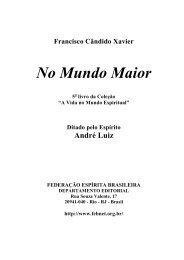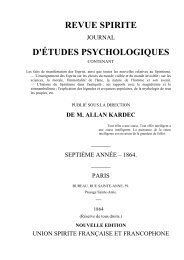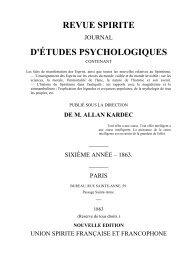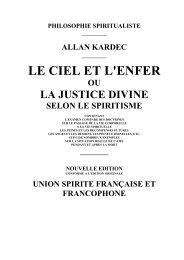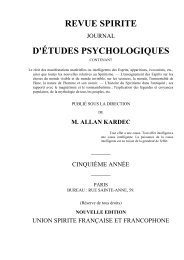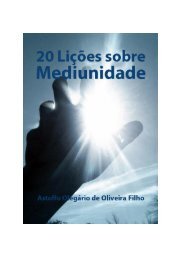PDF version - Geae
PDF version - Geae
PDF version - Geae
You also want an ePaper? Increase the reach of your titles
YUMPU automatically turns print PDFs into web optimized ePapers that Google loves.
The question of free will has a large importance and grave consequences for the social order by its<br />
effect on education, morality, justice, and legislation. It has determined two opposing currents of opinion – the<br />
negators of free will and those who admit it with restrictions. The argument of the fatalist is, ‘Man is under the<br />
control of his natural impulses, which dominate him, and oblige him to wish and decide in one direction more<br />
than another, therefore he is not free.’<br />
The opposite school brings out the theory of indeterminate causes. Charles Renouvier has been its<br />
most brilliant representative, and his ideas have been confirmed by Wundt, Fouillée and Boutroux in<br />
philosophical works, yet, in spite of the theologians, until now the question has remained practically insoluble.<br />
It could not be otherwise, since each one of the systems argues from the inexact idea that human beings have<br />
but one life to live. The subject assumes a holly different aspect if we enlarge the circle and consider the<br />
problem in the light of the doctrine of rebirth. We then see how each being gains his free will in the course of<br />
the evolutions he must accomplish. Supplied with instinct at first, which gradually gives place to reason, our<br />
liberty is very limited in our first stations, and during all the period of our early education. As soon as the mind<br />
gains and idea of law our free will expands. Always at each step in our ascension, and in hours of important<br />
resolution, it will be assisted, guided, and counseled by the great intelligences, the wiser and more enlightened<br />
spirits. Free will, the liberty of the soul, is exercised, above all, at the hour of reincarnation. In choosing the<br />
family and the environment, it knows in advance what trials await it, but it comprehends equally the necessity<br />
for these trials, to develop its qualities, eliminate its defect, and disintegrate its prejudices and vices. These<br />
trials may be the effect of a bad past, which it must repair, and it accepts them with resignation and<br />
confidence, for it knows that its great brothers in space will not abandon it in difficult hours. The future<br />
appears to it than, not in detail, but with all its salient points, or in the measure that this future is the result of<br />
anterior actions. These faults represent the part of ‘fatality’ or ‘predestination’ that certain men claim to see in<br />
all lives. They are simply the reflection of distant causes. In reality, nothing is fatal, and whatever the troubbles<br />
and responsibilities we encounter, we can always modify our fate by works of devotion, of goodness and<br />
charity, and sacrifices to duty.<br />
The problem of free will is of great importance from the judicial point of view. It is difficult to be<br />
exactly just in all the individual cases which come before a tribunal for preservation of social order. This can<br />
only be done by establishing the degree of evolution of the culprits. But human justice, little versed in these<br />
matters, rests blind and imperfect in its arrests and decisions. Often the wicked and culpable is in reality but a<br />
young ignorant spirit in whom reason has not had time to ripen. Duclos said: ‘Crime is often the result of false<br />
judgment.’ That is why there should be established penalties of a nature to compel the offender to enter into<br />
himself for instruction, light, and reform. Society should correct without passion or hate, else it renders itself<br />
culpable. Each soul is equivalent to its point of departure. They differ by their infinite degrees of advancement:<br />
the one young, the other old – diversely developed according to their age. It would be unjust to demand of an<br />
infantile mind merits equal to those one expects from a mature mind which has learned much. A great<br />
difference exists in their responsibilities.<br />
A human being is not really ripe for liberty until the universal exterior laws become interior and a part<br />
of his consciousness, by the fact of his evolution. The day when he is penetrated with the law, and makes it the<br />
rule of his actions, he attains the moral point where man possesses, dominates, and governs himself. From that<br />
hour he no longer needs social restraints or authority to direct him. It is the same with collective humanity.<br />
People are not truly free and worthy of liberty until they have learned to obey this law, eternal and universal,<br />
which emanates neither from the power of a caste or the will of crowds but from a higher power. Without the<br />
moral discipline which each individual should impose on himself, public liberty is but a mirage. It gives the<br />
appearance, but not the manners of a free people. Society remains exposed by its violence, its passions and its<br />
appetites, to all the complications and all the disorders of earth life.<br />
All which lifts us toward the light lifts us toward liberty, that flowers freely and beautifully in the<br />
higher life. The delayed and unconscious soul is kept down under the weight of material fatalities, while just in<br />
the measure it gains freedom, it lifts itself above these trials and comes closely to the divine.<br />
In general terms it may be said that each man arrives at the state of reason and responsibility according<br />
to the degree of his advancement. I leave aside the case of one who under the empire of a physical and moral<br />
cause, malady or obsession, has lost the use of his faculties. We know that in the strife between the two, the<br />
strongest souls triumph always. Socrates said that he had felt germinate in him, and had overcome, most<br />
107



